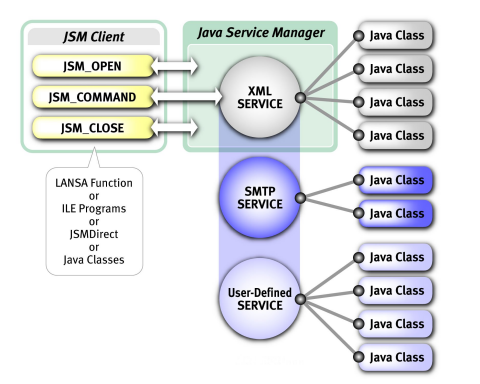1.1 What is Java Service Manager (JSM)?

The Java Service Manager:
- Allows integration of Java programs with existing LANSA or 3GL applications.
- Provides a standardized interface for calling Java classes using Java service programs. When a service is loaded into the JSM, it manages the interface to the services, handles the threading and provides tracing.
- Greatly simplifies the development of server applications requiring the integration of Java Services with LANSA or 3GL applications.
The Java Service Manager can be used by:
- LANSA functions (by using LANSA Built-In Functions (BIFs)).
- LANSA functions being executed over the Internet using HTTP.
- ILE programs (by calling the Java Service Manager APIs - similar to BIFs).
- Other Java classes.
Some of the services shipped with the Java Service Manager are:
- XMLBindFileService (Local XML file handling).
- XMLBindQueueService (MQSeries XML message handling).
- HTTPService (Generic HTTP service with dynamic content handlers).
- FTPService.
- POP3MailService.
- SMTPMailService.
The JSM includes Java classes for standard requirements such as exception handling, message handling, data conversion, etc.
To understand more about the Java Service Manager, it is recommended that you review:
1.1.1 Why use Java Service Manager?
1.1.4 How does the Java Service Manager work?